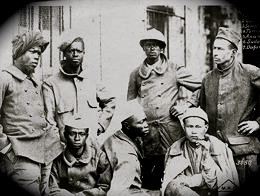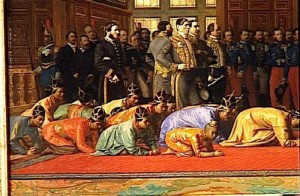Posté par INHA, le 22 avril 2024;
Organisation : Coline Desportes (EHESS/INHA), Aurélie Petiot (Université Paris Nanterre/InVisu (CNRS/INHA)
Ce colloque propose de se pencher sur la circulation de la transmission du geste et des techniques en contexte colonial et post-colonial, du XIXe au XXIe siècle. L’historienne de l’art Victoria L. Rovine rappelle que comme ses équivalents classificatoires « art » et « artefact », l’artisanat est un concept occidental, appliqué à des objets d’autres cultures dans le but de les absorber dans des pratiques de collection et d’exposition. En effet, si selon elle, l’exotisation européenne des Africains et de leur culture matérielle n’a certainement pas commencé avec l’ère coloniale moderne, l’artisanat a acquis une signification symbolique et économique en tant qu’outil de l’empire pendant l’entre-deux-guerres. S’il ne s’agit pas d’occulter les différentes formes d’enseignement . . . → En lire plus
Posté par Olivier Bonfait, le 14 décembre 2022;
- Date limite : 27 janvier 2023, 27 janvier 2023
 Constructing Coloniality: the Built Environment (London, 12-14 May 23) Constructing Coloniality: the Built Environment (London, 12-14 May 23)
The Bartlett School of Architecture, University College London, UK, May 12–14, 2023 Deadline: Jan 27, 2023
Society of Architectural Historians of Great Britain Annual Conference 2023. CONSTRUCTING COLONIALITY: BRITISH IMPERIALISM AND THE BUILT ENVIRONMENT.
Demands to ‘decolonise’ have grown louder and louder in recent years, not least in architecture, architectural history and heritage. In Britain public monuments and spaces have loomed large in discussions about the legacies of slavery and empire and the processes of repair, from Edward Colston in Bristol and Cecil Rhodes in Oxford, to Winston Churchill and numerous others in . . . → En lire plus
Posté par Pascale Dubus, le 2 mars 2020;
- Date de prise de fonction : Août 2020
- Durée du contrat : trois ans (2020-2023)
 The Department of Art and Art History at DePauw University invites applications for a three-year non-tenure-track position in early modern art (1400–1750) with a transnational focus, beginning August 2020. The successful candidate may have expertise in colonial and/or diasporic histories and/or Islamic, African, or Latin American art. The Department of Art and Art History at DePauw University invites applications for a three-year non-tenure-track position in early modern art (1400–1750) with a transnational focus, beginning August 2020. The successful candidate may have expertise in colonial and/or diasporic histories and/or Islamic, African, or Latin American art.
Applicants with a PhD (or ABD) in Art History, African Diaspora Studies, Latin American Studies, Religious Studies or other related areas with an emphasis on art history or visual culture are encouraged to apply.
The successful candidate will join the department, in partnership with our accredited gallery program, in our ongoing commitment to shifting the discourse of art history to be responsive to a . . . → En lire plus
Posté par INHA, le 30 janvier 2019;
- Date et lieu de la conférence : 31 janvier 2019, Paris
 Au cours d’une soirée exceptionnelle, qui aura lieu dans la prestigieuse salle Labrouste de la bibliothèque de l’Institut national d’histoire de l’art, l’INHA propose d’ouvrir le débat sur le thème « Face . . . → En lire plus Au cours d’une soirée exceptionnelle, qui aura lieu dans la prestigieuse salle Labrouste de la bibliothèque de l’Institut national d’histoire de l’art, l’INHA propose d’ouvrir le débat sur le thème « Face . . . → En lire plus
Posté par Denis Dubois, le 7 juin 2016;
- Date et lieu du colloque : 9-10 juin 2016, Paris, Centre allemand d’histoire de l’art
![8jb1-QzO-b9l4coN8P9xCjl72eJkfbmt4t8yenImKBVvK0kTmF0xjctABnaLJIm9[1]](http://blog.apahau.org/wp-content/uploads/2016/02/8jb1-QzO-b9l4coN8P9xCjl72eJkfbmt4t8yenImKBVvK0kTmF0xjctABnaLJIm91-300x205.jpg) Les études postcoloniales ont vivement critiqué l’exotisme. De ce fait, les premiers discours sur l’exotique et leur postérité sont également devenus suspects. La question de leur place au sein de l’histoire de l’art s’en est trouvée hâtivement occultée. Néanmoins, ce concept semble avoir donné lieu à un usage remarquablement fréquent, justement en raison de son caractère expérimental et équivoque. Le discours sur l’exotique repose manifestement sur une ouverture que l’on ne trouve pas sous la même forme dans la rhétorique antagoniste de « l’étranger » ou de « l’autre ». Au contraire de qualificatifs comme orientaliste ou primitiviste, l’exotique n’est limité ni historiquement, ni géographiquement, ni stylistiquement. Dans . . . → En lire plus Les études postcoloniales ont vivement critiqué l’exotisme. De ce fait, les premiers discours sur l’exotique et leur postérité sont également devenus suspects. La question de leur place au sein de l’histoire de l’art s’en est trouvée hâtivement occultée. Néanmoins, ce concept semble avoir donné lieu à un usage remarquablement fréquent, justement en raison de son caractère expérimental et équivoque. Le discours sur l’exotique repose manifestement sur une ouverture que l’on ne trouve pas sous la même forme dans la rhétorique antagoniste de « l’étranger » ou de « l’autre ». Au contraire de qualificatifs comme orientaliste ou primitiviste, l’exotique n’est limité ni historiquement, ni géographiquement, ni stylistiquement. Dans . . . → En lire plus
Posté par Denis Dubois, le 22 juin 2015;
- Date limite : 31 juillet 2015
- Date et lieu de la journée d'études : 17 September 2015, Londres, King's College
 If the First World War is usually defined as the military clash of empires, it can also be reconceptualised as a turning point in the history of cultural encounters. Between 1914 and 1918, more than four million non-white men were drafted mostly as soldiers or labourers into the Allied armies: they served in different parts of the world – from Europe and Africa to Mesopotamia, the Middle East and China – resulting in an unprecedented range of cultural encounters. The war was also a turning point in the history of photographic documentation as such moments and processes were recorded in hundreds of thousands of photographs by fellow . . . → En lire plus If the First World War is usually defined as the military clash of empires, it can also be reconceptualised as a turning point in the history of cultural encounters. Between 1914 and 1918, more than four million non-white men were drafted mostly as soldiers or labourers into the Allied armies: they served in different parts of the world – from Europe and Africa to Mesopotamia, the Middle East and China – resulting in an unprecedented range of cultural encounters. The war was also a turning point in the history of photographic documentation as such moments and processes were recorded in hundreds of thousands of photographs by fellow . . . → En lire plus
Posté par Sébastien Bontemps, le 21 avril 2013;
- Date limite : 10 mai 2013
- Date et lieu du colloque : Brisbane, Australia, June 27 - 28, 2013, Brisbane, Australia, June 27 - 28, 2013
 Brisbane, Australia, June 27 – 28, 2013 Deadline: May 10, 2013 Brisbane, Australia, June 27 – 28, 2013 Deadline: May 10, 2013
Call for Papers
Architecture at the Ragged Edge of Empire: Race, Place, Taste and the Colonial Context.
In his History of Queensland (2007), the historian Raymond Evans described the penal outpost of Moreton Bay (est. 1824 and later to become the colony of Queensland in 1859) as existing at the “ragged edge of Empire.” Initially a site of secondary punishment for reoffending convicts, ensuring it was both geographically and morally remote from the imperial centre, the later colony was also climatically diverse (ranging from the sub-tropical to the tropical), racially conflicted (the Indigenous population at times outnumbering convicts and settlers . . . → En lire plus
Posté par Zinaïda Polimenova, le 4 avril 2013;
- Date et lieu de la journée d'étude : 29 - 30 avril 2013, Paris, INHA.
 Les journées d’étude du Centre de recherche HiCSA– université Paris 1 Panthéon-Sorbonne, Art, images et pouvoir à l’époque coloniale et postcoloniale, sont organisées par Maureen Murphy (HiCSA) et Sophie Leclercq (Centre d’histoire culturelle de l’Université Versailles St-Quentin) Les journées d’étude du Centre de recherche HiCSA– université Paris 1 Panthéon-Sorbonne, Art, images et pouvoir à l’époque coloniale et postcoloniale, sont organisées par Maureen Murphy (HiCSA) et Sophie Leclercq (Centre d’histoire culturelle de l’Université Versailles St-Quentin)
29 – 30 avril 2013 9h00 – 18h00.
INHA Galerie Colbert, salle Vasari
Programme
29 avril 2013 9h30 / Introduction Philippe Dagen, Sophie Leclercq, Maureen Murphy
L’auto représentation des puissances coloniales Modérateur : Sophie Leclercq
10h00 / Pedro Martinho (Universidade Pedagogica, Maputo, Mozambique) La cartographie comme recours stratégique du pouvoir portugais à l’ère . . . → En lire plus
|
Équipe Rédacteur en chef : Olivier Bonfait.
Rédacteurs : Elliot Adam (Moyen Age) ; Nicolas Ballet (XX-XXIe siècles) ; Matthieu Fantoni (musées) ; Antonella Fenech Kroke (bourses) ; Vladimir Nestorov (Lettre mensuelle)
Administrateur web : Matthieu Lett.
ancien éditeur : Pascale Dubus
anciens rédacteurs : Gautier Anceau, Sébastien Bontemps, Damien Bril ; Sébastien Chauffour ; Ludovic Jouvet ; Aude Prigot
|



![8jb1-QzO-b9l4coN8P9xCjl72eJkfbmt4t8yenImKBVvK0kTmF0xjctABnaLJIm9[1]](http://blog.apahau.org/wp-content/uploads/2016/02/8jb1-QzO-b9l4coN8P9xCjl72eJkfbmt4t8yenImKBVvK0kTmF0xjctABnaLJIm91-300x205.jpg)


